Kerry to join Iran nuclear talks in bid to reach deal
Updated: 2013-11-08 09:28
(Agencies)
|
||||||||
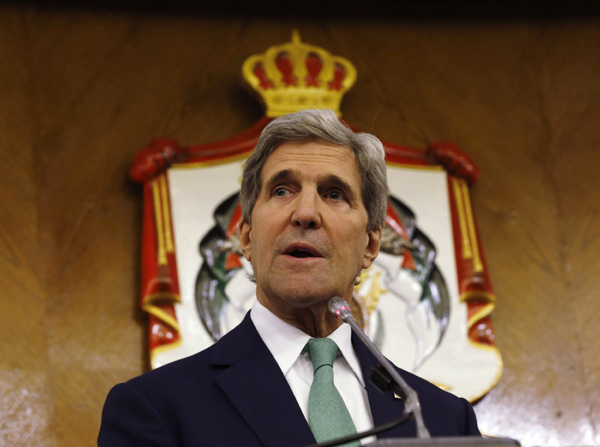 |
|
US Secretary of State John Kerry speaks at a news press conference with Jordan's Foreign Minister Nasser Judeh (not pictured) in Amman, Jordan, Nov 7, 2013. [Photo/Agencies] |
GENEVA - US Secretary of State John Kerry will join nuclear talks between major powers and Iran in Geneva on Friday in an attempt to nail down a long-elusive accord to start resolving a decade-old standoff over Tehran's atomic aims.
Kerry, on a Middle East tour, will fly to the Swiss city at the invitation of European Union foreign policy chief Catherine Ashton in "an effort to help narrow differences" in the negotiations, a senior US State Department official said.
Ashton is coordinating talks with Iran on behalf of the five permanent UN Security Council members plus Germany.
After the first day of a Nov 7-8 meeting, both sides said progress had been made towards an agreement under which the Islamic state would curb some of its nuclear activities in exchange for limited relief from sanctions that are severely damaging its economy.
Negotiators cautioned, however, that work remained to be done in the coming hours in very complex negotiations and that a successful outcome was not guaranteed. Iran rejects Western accusations that it is seeking the capability to make nuclear weapons.
Iranian Deputy Foreign Minister Abbas Araqchi said it was too early to say with certainty whether a deal would be possible this week, though he voiced cautious optimism.
"Too soon to say," Araqchi told reporters after the first day of talks between Iran and the United States, Russia, China, Britain, France and Germany. "I'm a bit optimistic."
"We are still working. We are in a very sensitive phase. We are engaged in real negotiations."
The fact that an agreement may finally be within reach after a decade of frustrated efforts and mutual hostility between Iran and the West was a sign of a dramatic shift in Tehran's foreign policy since the election of a relative moderate, Hassan Rouhani, as Iranian president in June.
The United States and its allies are aiming for a "first step" deal that would stop Iran from further expanding a nuclear programme that it has steadily built up in defiance of tightening international pressure.
The Islamic Republic, which holds some of the world's largest oil and gas reserves, wants them to lift increasingly tough punitive measures that have slashed its daily crude sales revenue by 60 percent in the last two years.
Both sides have limited room to manoeuvre, as hardliners in Tehran and hawks in Washington would likely sharply criticise any agreement they believed went too far in offering concessions to the other side.
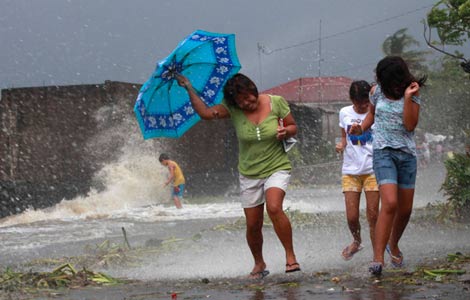
 Super typhoon Haiyan slams into Philippines, at least 3 dead
Super typhoon Haiyan slams into Philippines, at least 3 dead
 50 arrested at LA protest over Wal-Mart wages
50 arrested at LA protest over Wal-Mart wages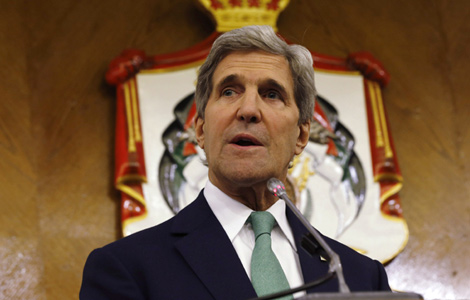
 Kerry to join Iran nuclear talks in bid to reach deal
Kerry to join Iran nuclear talks in bid to reach deal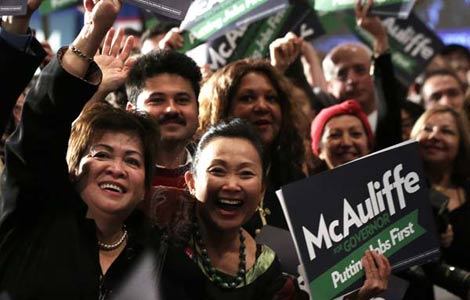
 Politicians court US-Asians amid anti-China sentiment
Politicians court US-Asians amid anti-China sentiment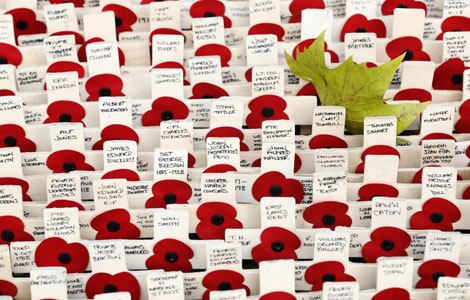
 Britain remembers war dead
Britain remembers war dead
 Stolen newborn returned to family
Stolen newborn returned to family
 TCM firms should 'learn rules of West'
TCM firms should 'learn rules of West'
 Artists see big picture in CBD's art zone
Artists see big picture in CBD's art zone
Most Viewed
Editor's Picks

|

|

|

|

|

|
Today's Top News
Kerry says aims to close 'important gaps' in Iran nuclear tal
Kerry to join Iran nuclear talks in bid to reach deal
Lenovo profit surges on smartphone, tablet sales
Houston and Shenzhen step up business
Bank exec describes meeting with Li Keqiang
CCBOT finds platform to tackle US market
BlackBerry could pay $250m break fee
China should allow for higher inflation: economist
US Weekly

|

|







